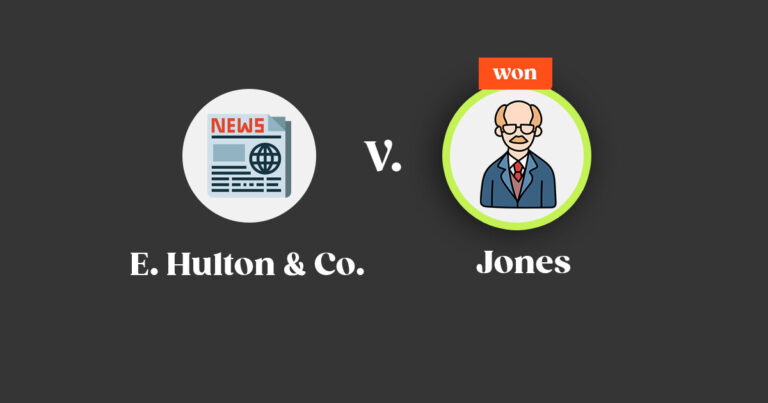Quick Summary
Artemus Jones (the plaintiff) sued a newspaper firm E. Hulton & Co. (the defendant) for Libel defamation after they published an article stating that he was seen with a woman who was not his wife. The defendant newspaper argued that the article did not reference the plaintiff and did not intend to defame him.
The fact that the defendant did not intend to defame the plaintiff is not a defense to the claim of libel. Instead, the court held that the defendant newspaper and its proprietors were responsible for the libelous statements and issued a damage against them.
The court reasoned that libel occurs when someone uses words that others in the same situation would understand to be.
Rule of Law
In libel cases, the intent is not required for a claim to be successful. However, the law acknowledges that even if a defendant did not intend to defame, the plaintiff’s reputation could still be harmed. Thus, the defendant can be held liable for harm caused by their words, regardless of intent.
Facts of the Case
Artemus Jones sued a newspaper firm, E. Hulton & Co., for defamation because they published an article that said that Jones had been seen with a woman who was not his wife.
Both parties agree that the defendant newspaper used the name Artemus Jones in a way that wasn’t real and wasn’t meant to refer to the plaintiff. The plaintiff also brought in witnesses who read the article and thought it was about them, even though it was really about someone else. The jury awarded damages to Jones.
Issue
Is the defendant responsible for the libel even when the article in question did not reference the plaintiff?
Holding and Conclusion
Yes.
This court upholds the ruling of the lower court. Therefore, the plaintiff had legal standing to continue the suit.
Since “a person accused with libel cannot defend himself by establishing that his intention was not to defame,” the journal and its proprietors were held responsible for the libelous statements.
According to Robert Reid, “whatever wonderful it may be,” purpose is not a defense. The countermeasure available to the defendant is “to refrain from defamatory comments.” Whether or not the article correctly identified the plaintiff is an issue of fact for the jury to determine.
Reasoning and Analysis
Libel occurs when someone uses words that others in the same situation would understand to be damaging to another person’s reputation. Defendant’s lack of malice in not intending to smear the plaintiff is not a valid defense.
The defendant’s acts, regardless of purpose, harmed the plaintiff. A libelous remark, for instance, might be made even if the author honestly believes the statement to be accurate.
The decision was affirmed, and the court issued a damage award against the defendant. The court ruled that if the defendant comments to the plaintiff without using his name, the burden of proof shifts to the plaintiff to show that the statement was intended to relate to him.
According to the court’s analysis, the plaintiff’s reputation was irreparably damaged due to publishing the defamatory statement. Whether the plaintiff had good intentions while making the defamatory remark is thus beyond the point.
Relevant FAQs of this case
How does the court determine if a statement is defamatory?
If a statement is defamatory by determining if it would be understood by others in the same situation to be damaging to another person’s reputation.
Can a defendant use the defense of not intending to defame the plaintiff in a libel case?
No, the fact that the defendant did not intend to defame the plaintiff is not a defense to the claim of libel. The court will focus on whether or not the statement was defamatory and if it harmed the plaintiff’s reputation, regardless of the defendant’s intent.
Can someone be sued for libel even if the statement is true?
Yes, a person can still be sued for libel defamation even if the statement is true. However, truth is generally considered a valid defense against a libel claim, as long as the statement is not made with actual malice or with the intent to harm the person’s reputation.
The truthfulness of the statement would be considered during the trial, and if it is determined that the statement is true, the libel claim would likely be dismissed.
Was this case brief helpful?
